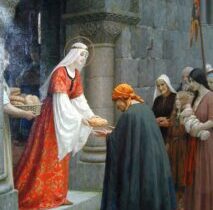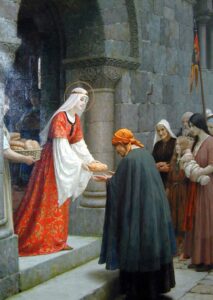A Letter from Saint Paul Le-Bao-Tinh
 This morning in the Liturgy of the Hours Office of Readings I came across a letter written by Saint Paul Le-Bao-Tinh, one of the 117 Vietnamese Martyrs that the Church celebrates today. Saint Paul, a priest, was imprisoned during one of the persecutions against Christians in 1843, and he wrote the following letter to his seminary students:
This morning in the Liturgy of the Hours Office of Readings I came across a letter written by Saint Paul Le-Bao-Tinh, one of the 117 Vietnamese Martyrs that the Church celebrates today. Saint Paul, a priest, was imprisoned during one of the persecutions against Christians in 1843, and he wrote the following letter to his seminary students:
I, Paul, in chains for the name of Christ, wish to relate to you the trials besetting me daily, in order that you may be inflamed with love for God and join with me in his praises, for his mercy is for ever. The prison here is a true image of everlasting hell: to cruel tortures of every kind—shackles, iron chains, manacles—are added hatred, vengeance, calumnies, obscene speech, quarrels, evil acts, swearing, curses, as well as anguish and grief. But the God who once freed the three children from the fiery furnace is with me always; he has delivered me from these tribulations and made them sweet, for his mercy is for ever.
In the midst of these torments, which usually terrify others, I am, by the grace of God, full of joy and gladness, because I am not alone—Christ is with me.
Our master bears the whole weight of the cross, leaving me only the tiniest, last bit. He is not a mere onlooker in my struggle, but a contestant and the victor and champion in the whole battle. Therefore upon his head is placed the crown of victory, and his members also share in his glory.
How am I to bear with the spectacle, as each day I see emperors, mandarins, and their retinue blaspheming your holy name, O Lord, who are enthroned above the Cherubim and Seraphim? Behold, the pagans have trodden your cross underfoot! Where is your glory? As I see all this, I would, in the ardent love I have for you, prefer to be torn limb from limb and to die as a witness to your love.
O Lord, show your power, save me, sustain me, that in my infirmity your power may be shown and may be glorified before the nations; grant that I may not grow weak along the way, and so allow your enemies to hold their heads up in pride.
Beloved brothers, as you hear all these things may you give endless thanks in joy to God, from whom every good proceeds; bless the Lord with me, for his mercy is for ever. My soul proclaims the greatness of the Lord, my spirit rejoices in God my Savior, for he has looked with favor on his lowly servant and from this day all generations will call me blessed, for his mercy is for ever.
O praise the Lord, all you nations, acclaim him all you peoples, for God chose what is weak in the world to confound the strong, God chose what is low and despised to confound the noble. Through my mouth he has confused the philosophers who are disciples of the wise of this world, for his mercy is for ever.
I write these things to you in order that your faith and mine may be united. In the midst of this storm I cast my anchor toward the throne of God, the anchor that is the lively home in my heart.
Beloved brothers, for your part so run that you may attain the crown, put on the breastplate of faith and take up the weapons of Christ for the right hand and for the left, as my patron Saint Paul has taught us. It is better for you to enter life with one eye or crippled than, with all your members intact, to be cast away.
Come to my aid with your prayers, that I may have the strength to fight according to the law, and indeed to fight the good fight and to fight until the end and so finish the race. We may not again see each other in this life, but we will have the happiness of seeing each other again in the world to come, when, standing at the throne of the spotless Lamb, we will together join in singing his praises and exult for ever in the joy of our triumph. Amen.
Saint Paul Le-Bao-Tinh is celebrated along with St. Andrew Dung-Lac and 115 others today. These 117 saints were chosen from among the approximately 130,000 Christians killed during the Vietnamese persecutions between 1625 and 1886. Despite over 50 decrees banning the Christian faith, the Church has grown to almost 6 million Catholics in Vietnam. Along with St. Andrew Dung-Lac, a diocesan priest, his companions included 11 Spanish missionaries, 10 French missionaries, and 96 Vietnamese priests and laity.
O God,source and origin of all fatherhood,who kept the Martyrs Saint Andrew Dung-Lacand his companions faithful to the Cross of your Son,even to the shedding of their blood,grant through their intercession, that,spreading your love among our brothers and sisters,we may be your children both in name and in truth.Through our Lord Jesus Christ, your Son,who lives and reigns with you in the unity of the Holy Spirit,God, for ever and ever. Amen.
Vietnamese Martyrs, pray for us!
Read More











